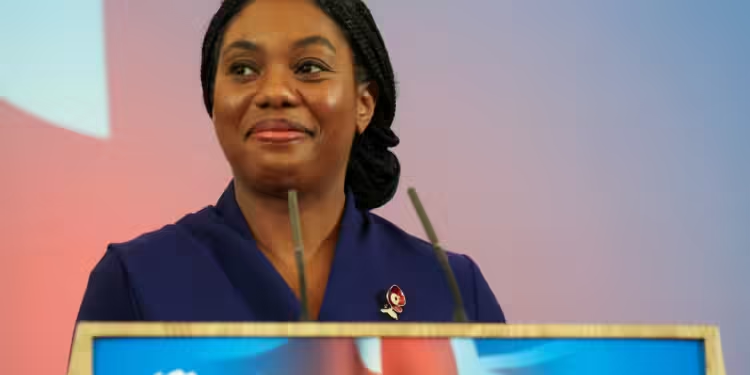Dec 3, 2024 Story by: Editor
Like her political idol Margaret Thatcher, Kemi Badenoch, the new Conservative leader, sparks debate even within her own party. Known for her “anti-woke” views and no-nonsense demeanor, Badenoch has garnered significant support among Conservative grassroots and the party’s right-wing, triumphing over fellow conservative Robert Jenrick.
As the first Black woman to head a major UK political party, Badenoch has made history. However, she distances herself from identity politics and is unlikely to emphasize this milestone as she tackles the challenging task of revitalizing her party’s fortunes.
Shaping the Conservatives’ Future
Badenoch’s critique of her party’s performance in the last general election centers on the belief that they “talked right, but governed left.” She asserts that to regain power, the Conservatives must “stop acting like Labour,” a principle central to her leadership campaign, which focused on shifting the British state’s mindset rather than detailing specific policies.
Born Olukemi Adegoke in Wimbledon in 1980, Badenoch grew up in Lagos, Nigeria, and the United States before returning to the UK at 16 due to Nigeria’s deteriorating political and economic conditions. After completing her A-levels in South London while working at McDonald’s, she pursued a degree in computer engineering at Sussex University, later earning a law degree and working in IT and finance.
Political Awakening
Her political journey began at Sussex University, where she found herself at odds with left-wing campus activism, which she described as the “spoiled, entitled, privileged metropolitan elite-in-training,” according to Blue Ambition, a biography by Conservative peer Lord Ashcroft. Joining the Conservative Party in 2005, she unsuccessfully contested seats in 2010 and 2012 before securing a London Assembly seat in 2015 and becoming an MP for Saffron Walden in 2017.
Climbing the Ranks
Badenoch’s direct approach and willingness to address controversial topics have defined her tenure. Her challenge to institutional racism narratives and opposition to self-certification of transgender identity has drawn criticism from the left and support from party traditionalists. Notably, as a junior equalities minister, she stated, “I came to this country aged 16 and now I am standing for prime minister—isn’t that amazing?”
In 2022, Badenoch surprised many by entering the Conservative leadership race despite her limited cabinet experience. Her campaign gained traction, supported by notable figures like Michael Gove, ultimately leading her to key cabinet roles under Liz Truss and Rishi Sunak.
Cultural and Policy Stances
Badenoch has not shied away from contentious issues. She spearheaded efforts to block Scotland’s Gender Recognition Reform Bill and criticized the NHS gender identity services for being “hijacked by ideologues.” Her opposition to gender-neutral toilets and perceived reluctance to legislate against menopause discrimination have further cemented her reputation as a polarizing figure.
Despite criticism, Badenoch remains steadfast in her convictions, emphasizing that Conservatism faces a crisis due to progressive ideologies, increased state intervention, and overregulation. She advocates for a return to Conservative core values and a systemic reset to address the country’s challenges.
Looking Ahead
As the Conservative leader, Badenoch faces the monumental task of uniting her party and addressing economic and cultural divides. While some MPs express reservations about her combative style, her supporters see this as her strength: a willingness to “tell the truth” and defend Conservative principles.
With her sights set on reshaping her party and the nation, Kemi Badenoch’s leadership promises a new chapter in British politics, one that will undoubtedly remain under intense scrutiny. Source: BBC

















